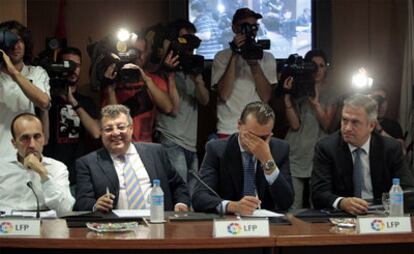La Liga moves closer to strike
Second meeting slated for Friday after AFE and LFP fail to break deadlock; big-name players, including Spain captain Iker Casillas, consider salary guarantee fund offer insufficient
La Liga moved a step closer to a strike on Wednesday as representatives of the Association of Spanish Footballers (AFE) and the Professional Football League (LFP) failed to break an impasse over a new collective bargaining agreement. The two parties met in Madrid but were unable to find common ground. A further meeting has been scheduled for Friday, at which if no progress is made, all Primera and Segunda División matches programmed over the weekend will be cancelled.
The first match of the 2011-2012 season in the second tier, Villarreal B versus Hércules, is scheduled at 9pm the same day. The first meeting between the AFE and LFP was slated for last Monday, but eventually postponed due to a regional bank holiday.
"We have not reached an agreement," the president of the LFP, José Luis Astiazarán, said, adding he felt the threat of a stoppage was "unjustified."
AFE spokesman Luis Gil countered that the LFP had made no suitable proposal toward rapprochement. "The [two parties'] stances are at a considerable distance apart, even more so [than before], if such a thing were possible."
"We will work throughout the weekend and in the next two days we will decide when the games will be played if finally there is a strike," Astiazarán said. "We are in a very complex economic situation. If we accept that there are 200 players who haven't been paid, we are talking about 20 percent of the total. Compared with unemployment in Spain, at least they have jobs."
The main sticking point in negotiations is the salary guarantee fund proposed by the LFP to cover players' wages in the case their clubs cannot. "We don't understand how they cannot consider the fund valid," Astiazarán said last Friday when the strike was first mooted.
"The clubs have approved a fund that guarantees part of players' salaries, 240,000 euros for each Primera player and 120,000 euros for each in Segunda. They are significant figures." The AFE says that the 200 players who have not been paid, some for several months, are owed a total of 50 million euros from their clubs. "The strike action is still in place," said Gil, adding the "main problem is the guarantees for players."
The LFP has offered a fund of 40 million euros up to the 2014-15 season, which the AFE, backed by big-name players such as Spain captain Iker Casillas, considers insufficient.
"We want them to act as guarantor for the debt that already exists and that the fund will not be necessary. The Sports Law needs to be applied; if a club doesn't pay its players, it should be relegated," Gil said.
If the strike goes ahead, it will be the first since 1984 and the fourth in the history of Spanish soccer.
The first took place in 1979, just a year after the AFE came into being. The players downed their boots to do away with restrictions that are ancient history today: a club's right to retention, whereby it could keep a player on its books indefinitely with a small annual salary rise; a reluctance of clubs to pay into the social security system for players, and a rule stating that no player under the age of 23 could play in Tercera División.
A second strike in 1981 saw action cancelled on the first day of the season. The stoppage ran out of steam in the second round of fixtures, with clubs fielding youth players. The AFE eventually managed to get debts paid off and a rule obliging teams to field a player under 20 years of age scrapped.
The 1984 strike saw teams field youth players on September 9 and the following week no games were played after the judiciary prohibited the practice.

Tu suscripción se está usando en otro dispositivo
¿Quieres añadir otro usuario a tu suscripción?
Si continúas leyendo en este dispositivo, no se podrá leer en el otro.
FlechaTu suscripción se está usando en otro dispositivo y solo puedes acceder a EL PAÍS desde un dispositivo a la vez.
Si quieres compartir tu cuenta, cambia tu suscripción a la modalidad Premium, así podrás añadir otro usuario. Cada uno accederá con su propia cuenta de email, lo que os permitirá personalizar vuestra experiencia en EL PAÍS.
¿Tienes una suscripción de empresa? Accede aquí para contratar más cuentas.
En el caso de no saber quién está usando tu cuenta, te recomendamos cambiar tu contraseña aquí.
Si decides continuar compartiendo tu cuenta, este mensaje se mostrará en tu dispositivo y en el de la otra persona que está usando tu cuenta de forma indefinida, afectando a tu experiencia de lectura. Puedes consultar aquí los términos y condiciones de la suscripción digital.








































